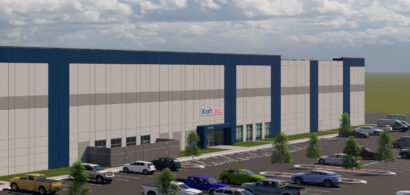Illinois’ “quantum prairie” rivals Silicon Valley
Historic partnership between top universities in the U.S. and Japan, with support from prominent tech powerhouses, cements Illinois’ leading role in the future of quantum computing.
Illinois, a state long known for its pioneering spirit, is pushing into new frontiers of computing with the University of Chicago’s recent announcement of its partnership with the University of Tokyo for research into quantum computing. Backed by a $150 million grant from IBM and Google, Illinois and Japan are embarking on a 10-year journey into the subatomic realm with the potential to create jobs for the next century.

Photo by Nancy Wong
In traditional computing, electrons flowing through silicon microchips process and store information as bits, either 1s or 0s. By contrast, quantum computers tap into the strange properties of the physical laws that govern subatomic particles. That makes them capable of storing information as both a 1 and a 0 at the same time – a qubit – allowing them to perform certain complex calculations much faster than regular computers.
Part of the grant tasks the two universities with building a supercomputer containing 100,000 qubits, which would dwarf the 433-qubit processor featured in IBM’s current largest quantum computer. Because current quantum computers are unstable and error-prone, a second part of the grant focuses on making them more reliable while training the quantum workforce of the future.
Already known for its leading role in finance, food, and advanced manufacturing, Illinois is a major player in quantum computing, which has the potential to impact fields like artificial intelligence, encryption and cryptography, finance, drug discovery, and more. Along with hosting a range of offices and facilities for Google and IBM, Illinois is home to four of the nation’s 10 quantum computing centers, the most of any state.
Moreover, Illinois boasts the country’s longest quantum network, spanning 124 miles of connections between the U.S. Department of Energy’s Argonne National Laboratory, the University of Chicago, and the Chicago Quantum Exchange, itself the beneficiary of a $200 million investment by the state. It is also home to Duality, the first accelerator program in the U.S. exclusively focused on supporting innovative quantum startups.
The state’s history of computing innovation and collaboration with Japan goes back 70 years to the world’s earliest computers. In 1952, the University of Illinois unveiled ILLIAC I, the first computer built and owned entirely by an American educational institution, with the help of visiting Japanese scholars. By 1956 it had more computing power than all of Bell Telephone Laboratories, one of the most storied research facilities in history. The Japanese engineers later used their experience to develop the MUSASINO-1 computer, which was one of the earliest electronic digital computers built in Japan.
Illinois is building on this history of success and betting on co-innovation. In taking the next quantum leap, the state is investing in the technology and jobs of tomorrow.
Related Articles
Be in touch
Are you ready to be where the action is? Reach out to the Intersect Illinois team to discuss properties perfectly suited for your business.


